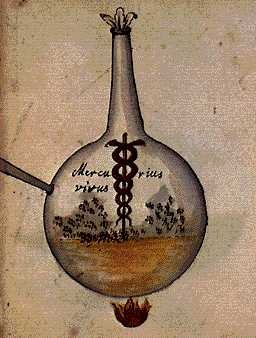Mercury process: Difference between revisions
No edit summary |
No edit summary |
||
| Line 1: | Line 1: | ||
[[File:Mercurius CABALA MINERALIS.jpg|thumb|Our Mercurius, the bridging water of life (''Mercurius noster. Aqua viva pontica.'')<br>Source: [https://www.alchemywebsite.com/cab_min1.html Cabala Mineralis]]] | [[File:Mercurius CABALA MINERALIS.jpg|thumb|Our Mercurius, the bridging water of life (''Mercurius noster. Aqua viva pontica.'')<br>Source: [https://www.alchemywebsite.com/cab_min1.html Cabala Mineralis]]] | ||
The '''mercury process''' is one of the three basic processes of the [[Alchemy|alchemical]] [[Tria Principia]]. [[w:Mercury (element)|Mercury]] is one of the seven [[planetary metals]]; the planet [[Mercury]] is assigned to it. The '''Mercurius''' of the [[alchemist]]s stands for everything [[ | The '''mercury process''' is one of the three basic processes of the [[Alchemy|alchemical]] [[Tria Principia]]. [[w:Mercury (element)|Mercury]] is one of the seven [[planetary metals]]; the planet [[Mercury]] is assigned to it. The '''Mercurius''' of the [[alchemist]]s stands for everything [[metal]]lic, fusible, liquid; the common alchemical symbol for it is the [[w:Lilium|lily]]. Mercurius is the volatile-liquid principle that mediates between the fiery [[Sulphur process|sulphur]] and the form-giving [[salt process]]. The [[water element]] works in it and it is also called the bridging [[water of life]] ({{Latin|aqua viva pontica}}) or [[mercurial water]]. The material representatives in which the Mercury process has come to rest externally are above all [[w:Mercury (element)|mercury]], [[water]] and [[alcohol]]. On a purely physical level, the mercurial process corresponds to the [[w:metallic bond|metallic bond]] known from [[w:chemistry|chemistry]]<ref>V. Gutmann, E. Hengge: ''Allgemeine und anorganische Chemie'', Verlag Chemie, Weinheim 1975, p. 3</ref>. | ||
== The mercury process in man and plants == | == The mercury process in man and plants == | ||
Latest revision as of 08:42, 8 May 2021

Source: Cabala Mineralis
The mercury process is one of the three basic processes of the alchemical Tria Principia. Mercury is one of the seven planetary metals; the planet Mercury is assigned to it. The Mercurius of the alchemists stands for everything metallic, fusible, liquid; the common alchemical symbol for it is the lily. Mercurius is the volatile-liquid principle that mediates between the fiery sulphur and the form-giving salt process. The water element works in it and it is also called the bridging water of life (Latin: aqua viva pontica) or mercurial water. The material representatives in which the Mercury process has come to rest externally are above all mercury, water and alcohol. On a purely physical level, the mercurial process corresponds to the metallic bond known from chemistry[1].
The mercury process in man and plants
In the threefold human organism, the mercury process works predominantly in its rhythmic system, i.e. in respiration and blood circulation. In the plant, mercurial activity unfolds in the area of the green leaves, whereby assimilation through photosynthesis comes to the fore instead of respiration.
The mercury process in the course of the year
In the deep winter period, the three alchemical processes are largely separated from each other. For the imaginative gaze, the Earth then appears, as it were, as a large mercury drop in space - or rather as half a mercury drop, for this only applies to the hemisphere on which it is currently winter. (Lit.:GA 229, p. 24f)
Literature
- Rudolf Steiner: Das Miterleben des Jahreslaufes in vier kosmischen Imaginationen, GA 229 (1999), ISBN 3-7274-2290-4 English: rsarchive.org German: pdf pdf(2) html mobi epub archive.org
- Rudolf Steiner: Die vierte Dimension, GA 324a (1995), ISBN 3-7274-3245-4 English: rsarchive.org German: pdf pdf(2) html mobi epub archive.org
 |
References to the work of Rudolf Steiner follow Rudolf Steiner's Collected Works (CW or GA), Rudolf Steiner Verlag, Dornach/Switzerland, unless otherwise stated.
Email: verlag@steinerverlag.com URL: www.steinerverlag.com. Index to the Complete Works of Rudolf Steiner - Aelzina Books A complete list by Volume Number and a full list of known English translations you may also find at Rudolf Steiner's Collected Works Rudolf Steiner Archive - The largest online collection of Rudolf Steiner's books, lectures and articles in English. Rudolf Steiner Audio - Recorded and Read by Dale Brunsvold steinerbooks.org - Anthroposophic Press Inc. (USA) Rudolf Steiner Handbook - Christian Karl's proven standard work for orientation in Rudolf Steiner's Collected Works for free download as PDF. |
References
- ↑ V. Gutmann, E. Hengge: Allgemeine und anorganische Chemie, Verlag Chemie, Weinheim 1975, p. 3
